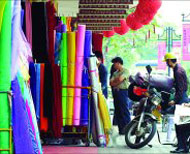
China will impose tariffs on six categories of textile exports beginning from this Saturday. They will mostly range from 0.2 yuan to 0.3 yuan (2.4-3.6 US cents) every piece or set.
The six categories of 148 tariff items, include knitted shirts, non-knited shirts, underwear and night clothes, overcoats, skirts and trousers.
For every piece or set of the apparel, the tariff will be 0.2 yuan (2.4 US cents) or 0.3 yuan (3.6 US cents). For clothing parts or accessories, the tariff will be 0.5 yuan (6 US cents) per kilogram.
China announced on December 12 that it will impose tax tariffs on certain textile exports, but it did not identify the specific rates and products.
The export tariff is a key policy of the eight textile export management measures put into place by the Ministry of Commerce, to address the concerns of trade partners.
Industry insiders said the tariffs will have limited impact on exports with higher values.
But for producers of goods such as briefs, the tariff will be a heavy blow, insiders said when they received the detailed tariffs yesterday.
The response echoed the government's original intention, which said the duty will be collected by quantity of textile goods rather than value, as a way to encourage exports of high added value.
Wei Bensen, a manager of the import & export department under the China Yeliya Garment Group, said a tariff around 3 US cents for every piece is "a small thing" for the company.
Wei said most of the company's products are covered by the new export tariffs.
The company major lines of production are woollen suits, dresses and shirts, which have relatively high values.
Wei said the new tariffs will only account for a low percentage of the profits it earns from processing.
For example, 10 per cent of a set of US$12 suits will be paid to Chinese companies as processing fees. The tariff of 3 US cents is only 2.5 per cent of the US$1.20 processing fee.
And Wei said they will talk with foreign companies to let them pay the tariff bill in the future.
But for the producers processing briefs, which usually earn several US cents for every piece, the 3 US cents will be a big amount.
An official from the Chinese Textile Industry Association also estimated the textile business will not be severely affected by the new tariff.
He said the new tariff is limited to apparel exports only, in which Chinese producers have evident advantages.
But he said it is early to estimate how much of a percentage of export growth will be affected.
The tariffs will be imposed on Saturday, the same day for lifting textile trade quotas between World Trade Organization members as was agreed a decade ago.
Some foreign counterparts have predicted Chinese textile goods, supported by cheap labour costs, will flood the world market and force them out. Seventy-two textile and apparel groups from 36 countries have even made the "Istanbul Declaration" to request the WTO extend quota-free deadlines until December 31, 2007, but it has failed.
Foreign governments have also put pressure on Chinese Government to cap its textile exports. Grant Aldonas, the US Commerce Department's under-secretary for international trade, visited China in September to seek an agreement on voluntary caps. The EU also urged Chinese Prime Minister Wen Jiabao during his recent EU trip to exercise "moderation" on textile exports.
As a reaction to their concerns, China has put in place these measures to control textile exports.
Besides the tariffs, measures also include making textile companies report on their expansion plans, encouraging them to invest abroad, and fostering the development of domestic brands.
China's sacrifice has been largely praised by other countries, which view it as a responsible move.
But the abuse of special safeguard measures is also a big headache for Chinese textile companies.
In the latest development, Turkey decided to impose textile quotas to restrict Chinese textile imports in 42 categories. The move angered China and it has asked Turkey to revoke the decision.
The Bush administration has imposed safeguard measures on Chinese imports of knitted fabrics, dressing gowns and bras last November and socks this October.
(China Daily December 28, 2004)
|

